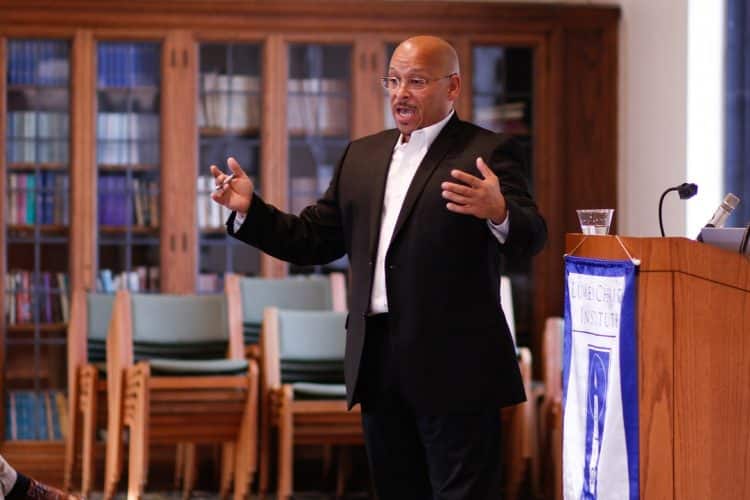Lumen Christi’s Black Catholic Scholarly Initiative picked up steam recently with the creation of a steering committee, led by Darren Davis, a professor of political science and the director of the Center for Social Research at the University of Notre Dame. Davis described the initiative, which sprouted as an idea about two years ago, as “extremely necessary” and “long overdue.”
“There are many Black Catholic academics and intellectuals, who share a common identity, common concerns, and common ways of thinking about what is happening in the Church and in society,” he said. “For too long, this Black Catholic perspective has been minimized,” he added.
Davis noted the existence of the Institute for Black Catholic Studies at Xavier University in New Orleans, which focuses on offering formation for pastoral ministry to Black Catholics. His hope is that Lumen Christi’s Black Catholic Scholarly Initiative will develop instead as a space “where part of the Church does its thinking.”
“I would like to see it develop as a place where Black Catholics can turn for insight into different Church policies (and) issues in society,” he said.
This year alone, Lumen Christi organized or co-sponsored four webinars in furthering this initiative.
The political scientist had presented his book, “Perseverance in the Parish? Religious Attitudes from a Black Catholic Perspective,” at Lumen Christi in 2018. The book, published by Cambridge University Press, reported the findings of the first national survey of Black Catholics in the United States. The study found that Black Catholics are among the strongest religious identifiers in the U.S. Church, despite the racism and prejudice they experience there.
“The Black Catholic experience in the Church has been one of neglect, conflict and ambivalence,” and has shaped a rather homogeneous Black Catholic perspective, said Davis, a cradle Catholic.
In sum, the ongoing presence of Black Catholics in the Church, which “hasn’t always appreciated diversity,” is not a sign that the Church is without racism and prejudice, but that Black Catholics have found ways to navigate and cope with the racism and prejudice in order to persevere in the faith, he said. Religion is extremely important to Black Catholics, so abandoning the Church is not an option, as it would mean they would lose a fundamental part of their identity and heritage, he added.
The ongoing presence of Black Catholics in the Church…is not a sign that the Church is without racism and prejudice, but that Black Catholics have found ways to navigate and cope with racism and prejudice in order to persevere in their faith.
His new book, “Racial Resentment: The Rationalization of Equality and Privilege,” co-authored with David Wilson, is slated for release next year by University of Chicago Press. The book explains how “normal, everyday citizens can support, look like, and actually end up in the same bucket as racists” in their commitment to their sense of justice or fairness.
The fundamental belief at the heart of racial resentment is that people get what they deserve, or rather what they rightly earn, based on merit. However, when people see that a certain racial or ethnic group receives special treatment in the form of resources or advantages, they develop resentment toward that group.
“When people perceive others benefiting unfairly, that is when (social) problems occur,” he said.
These people are not necessarily racist or motivated by feelings of hatred or superiority, but their resentment has the same effect as if they were, in that they wind up supporting racist policies and ideologies, he explained.
“Political scientists are very good at pointing out problems, but not at finding solutions,” he said. “We don’t really have a solution (to racial resentment) and, to tell you the truth, I don’t know that there is a solution.”
